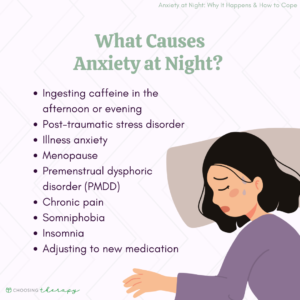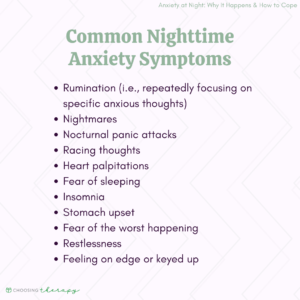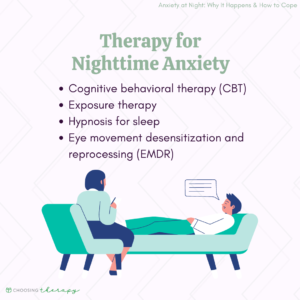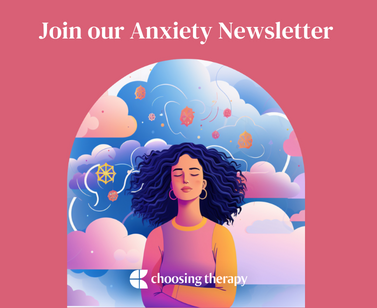Anxiety at night can cause much distress and disruption in your life. Nighttime anxiety can be associated with rumination, sleep issues, nightmares, nocturnal panic attacks, and heart palpitations.1,2,3,4,5,6,7 Tiredness, which reduces our ability to cope with distress, can also result in anxiety being triggered more easily. Know that there are things you can do to help yourself with nighttime anxiety.
Find a supportive therapist who can help with anxiety.
BetterHelp has over 20,000 licensed therapists who provide convenient and affordable online therapy. BetterHelp starts at $65 per week. Take a Free Online Assessment and get matched with the right therapist for you.
Why Does Nighttime Anxiety Occur?
Nighttime anxiety isn’t a diagnosis but describes what some people experience and may cause insomnia and/or poor sleep quality. Nighttime anxiety and insomnia typically happen for short periods of time and are not always related to an anxiety disorder, but having nighttime anxiety can increase symptoms of anxiety disorders (e.g., GAD or panic disorder).1,5,6 It might also arise due to certain behaviors you engage in or physiological conditions you are experiencing.
Anxiety at Night Symptoms
Anxiety symptoms at night might be similar to or different from the anxiety symptoms you experience during the day. Although many specific symptoms are associated with anxiety, your experience of nighttime anxiety is unique to you.
Common nighttime anxiety symptoms you might be experiencing include:8
- Rumination (i.e., repeatedly focusing on specific anxious thoughts)
- Nightmares
- Nocturnal panic attacks
- Racing thoughts at night
- Heart palpitations
- Fear of sleeping
- Insomnia
- Stomach upset
- Fear of the worst happening
- Restlessness
- Feeling on edge or keyed up
What Causes Anxiety at Night?
Anxiety at nighttime can be caused by several physiological or psychological factors. It can also be the result of negative thought patterns or behaviors that interfere with the ability of your body and mind to start the process of relaxing and preparing for sleep.
Common causes of nighttime anxiety can be linked to certain behaviors or physiological conditions: 9,8,11,10,12,13
- Ingesting caffeine in the afternoon or evening (or caffeine addiction): Caffeine is a stimulant which affects the nervous system resulting in increased energy and alertness, and decreased sleep duration and efficiency.
- Post-traumatic stress disorder: For those for whom trauma happened at night or who experience trauma-related nightmares or night terrors, going to sleep can become terrifying and lead to anxiety before bed.
- Illness anxiety: If you are a person who struggles with health/illness anxiety, you might experience an increase in nighttime anxiety due to being less busy – which might allow those thoughts to move in and take over.
- Menopause: Hormonal shifts in the body due to menopause are related to increased anxiety and sleep disturbance.
- Premenstrual dysphoric disorder (PMDD): PMDD symptoms include increased irritability, sleep problems, anxiety, and feeling overwhelmed.
- Chronic Pain: Chronic pain is associated with increased anxiety disorders] and sleep difficulties.
- Somniphobia: Somniphobia or sleep anxiety refers to an extreme fear related to the thought of going to sleep or sleeping.
- Insomnia: Anxiety often precedes insomnia, and there can be an interplay between the two, with insomnia resulting in more time to worry and the anxiety interfering with your ability to go to sleep and stay asleep.
- Adjusting to a new medication – Sometimes, as you are adjusting to a new medication, you might experience side effects of increased anxiety, agitation, or “jitteriness” for a time, which can increase your distress when trying to get ready to sleep. These side effects are more common when starting a new antidepressant.
Impacts of Anxiety Before Bed On the Next Day
Anxiety before bed has been linked to insomnia and poor quality and duration of sleep, while similarly, lack of sleep has been found to increase anxiety.1,5,6,16 Individuals experiencing both anxiety disorders and sleep disturbances are more likely to experience the impact of sleep on mental health and have difficulties with daytime functioning, and are more likely to have to take time off work.5
Options For Anxiety Treatment
Talk Therapy – Get help from a licensed therapist. Betterhelp offers online therapy starting at $65 per week. Free Assessment
Psychiatry for Anxiety – Looking for anxiety treatment that prioritizes you? Talkiatry can help. Find an in-network psychiatrist you can see online. Get started with our short assessment. Visit Talkiatry
How to Cope With Anxiety at Night
There are things you can do to help yourself to manage symptoms of bad anxiety at night. Try some of the lifestyle, behavioral, and self-help strategies below to learn how to calm anxiety and help end distressing nighttime anxiety.
Below are 10 ways to minimize nighttime anxiety:
1. Meditation
Meditation for anxiety can improve sleep and reduce the anxiety that keeps you up by helping you to focus your thoughts away from fear and worry and on the present moment instead. It can also help settle your nervous system.
2. Plan Your Evening in Advance
An evening ritual focusing on self-care and preparing yourself to rest can help reduce anxiety. This might involve staying away from social media and any intense emotional/physical activities at least a half hour before bed and instead doing something soothing or relaxing such as stretching, yoga, meditation, journaling, or taking a warm shower or bath.
A daily evening self-care plan can give you something to look forward to and help guide your thoughts in a more positive direction. Night anxiety can be reduced by having a positive, predictable nighttime routine.
3. Breathing Exercises
Breathwork, which involves consciously focusing on your breathing, can be effective in the evenings to elicit a deep sense of relaxation throughout your entire body. 14 Mindful breathing exercises require your mind and body to be in the immediate present moment – rather than in the imagined future, where your anxiety and fears are often fixated.
Breathwork can allow you to influence your own nervous system – to move from a nighttime anxiety response to a relaxation response. You might find that breathwork is an effective way to not only reduce your nighttime anxiety but to reduce your anxiety overall. 14
4. Grounding Techniques
Grounding techniques focus on using your senses (i.e., sight, hearing, touch, smell, and/or taste) to help you to better connect with the present moment – rather than being caught up in your mind and distressing thoughts.
5. Exercise
The mental health benefits of exercise are widely documented. Exercise of any type can improve your health and mental health.15,16 Exercise improves sleep quality and can reduce anxiety symptoms. 17,18,19
6. Journaling
Journaling your worries and fears in the evening might help reduce your anxiety. Journaling for mental health can allow you to identify your anxieties, externalize them (i.e., take them out of your mind and put them on a page), and provide a place for them to be “contained” outside your thoughts. This might allow for a different perspective that can lead to more objective thinking.
7. Progressive Muscle Relaxation
Progressive muscle relaxation involves consciously tensing and relaxing specific muscle groups in order from head to toe (or feet to head) to activate the body’s relaxation response. Progressive muscle relaxation has been shown to reduce stress and tension in body and mind. 20 It has also been found to significantly reduce anxiety and depressive symptoms. 21
8. Yoga
Yoga is a mindfulness-based activity that involves the mind, body, and spirit. Focused, mindful breathing, physical postures, and thoughts reduce stress; for some, yoga might also reduce symptoms of anxiety and depression.
9. Mindfulness
Mindfulness involves consciously focusing, in a non-judgmental and curious way, on the information you get through your senses and thoughts. It involves noticing what is happening in the present moment – without evaluation or reaction – and accepting what is. It is similar to watching clouds in the sky…just noticing them without judgment.
10. Self-Soothing
Self-soothing refers to things you can do to comfort and calm yourself through your senses (i.e., sight, sound, taste, touch, and smell). Some common self-soothing strategies that you might find helpful to reduce your nighttime anxiety include focusing on the comfort provided by:
- Looking at a picture or video of loved ones or a favorite place
- Looking at nature
- Covering yourself with a soft and/or weighted blanket
- Petting an animal
- Listening to calming music or a meditation
- Having a warm (non-alcoholic) drink
- Lighting a scented candle
When to Seek Professional Help
It is time to consider therapy for your nighttime anxiety if it significantly interferes with your sleep and/or your ability to function in one or more areas of your life (e.g., leading to issues at work, in your relationships, etc.) This is especially true if you have tried the above-suggested strategies and have not noticed improvement.
Therapy and/or medication might be recommended depending on your individual circumstances and preferences. If you need help finding an online therapist or choosing a professional, you can use an online therapist directory. You might also want to consult with an online psychiatrist. Look for a therapist who has expertise in the area of anxiety.
Professional treatment options for anxiety at night might include individual counseling, psychotherapy, and/or medication.
Therapy Options
Some psychotherapy approaches that can help with bedtime anxiety include:
- Cognitive Behavioral Therapy (CBT): In CBT for insomnia, the therapist works with you to identify thoughts and behaviors that are contributing to your anxiety at night and seeks to reduce or eliminate the anxiety by assisting you in changing these thoughts and behaviors.
- Exposure Therapy: In exposure therapy, the therapist will initially teach you relaxation techniques, which you will then use as you imagine the situations that trigger your evening anxiety (starting with the least distressing) – until you get to a place where your anxiety response is replaced with a relaxation response.
- Hypnosis for Sleep: Hypnosis that includes sleep suggestions, and/or a focus on relaxation and stress reduction – is a promising intervention and might be helpful to address your nighttime anxiety, particularly if you also experience insomnia.22
- Eye Movement Desensitization and Reprocessing (EMDR): If nighttime anxiety is related to PTSD, EMDR might be an effective therapy to address both the anxiety and PTSD symptoms that interfere with sleep.
Would you like to have less anxiety?
Anxiety is treatable with therapy. BetterHelp has over 20,000 licensed therapists who provide convenient and affordable online therapy. BetterHelp starts at $65 per week. Take a Free Online Assessment and get matched with the right therapist for you.
Medications
SSRIs and SNRIs are considered to be the first-line pharmacological treatments for anxiety and might be prescribed for severe nighttime anxiety symptoms. If these are not effective or appropriate for the individual, Benzodiazepines might be considered as medication for anxiety. 23,24
Medications that have been proven to be effective at reducing symptoms of anxiety include:
- Benzodiazepines: Benzodiazepines are a sedative and hypnotic, but should only be used for 2-4 weeks at most, due to the risk of dependency. 25
- SSRIs: SSRIs increase the concentration of the neurotransmitter, serotonin, the brain – which impacts mood, sleep, thinking, and movement. 126
- SNRIs: SNRIs increase the concentration of both neurotransmitters, serotonin (see above) and norepinephrine (which impacts energy level and alertness).
Alternative Medicine & Herbal Remedies
Alternative medicine and herbal remedies might be interesting to you if you are dealing with nighttime anxiety. The difficulty with identifying which of these are likely to be effective lies in the limited research on these medicines and remedies and particularly comparing their effects to more traditional medications. 27,28,29 Based on the limited research available, however, there are some natural remedies that have demonstrated a significant reduction in anxiety symptoms, and thus might help with your nighttime anxiety.
Alternative treatments for nighttime anxiety include:
- Kava-Kava: a meta-analysis study (which systematically analyzed the results of previous studies) on Kava in relation to anxiety, indicated that its use resulted in a significant reduction in anxiety symptoms.29
- Ginko Biloba: Two doses of a standardized extract of Ginko Biloba was shown to result in a greater reduction in anxiety symptoms as compared to a placebo.30
- Passionflower: Passionflower extract has been demonstrated to be effective in reducing anxiety among outpatients with Generalized Anxiety Disorder (GAD).31
- Camomile: Camomile extract, when administered over an 8-week period, was found to result in a significant reduction in anxiety symptoms compared to a placebo.32
- Galphimia glauca: Extract of Galphimia glauca, used as a sedative in traditional Mexican medication, was compared to lorazepam to treat anxiety, and both groups experienced a significant reduction in anxiety, with no differences between groups.33
Final Thoughts
If you are dealing with nighttime anxiety, know that you are not alone. Several strategies and herbal remedies might provide you with the relief you are looking for. If these don’t work for you, don’t hesitate to talk with your doctor or a therapist who specializes in anxiety about your concerns.
Online Anxiety Test A few questions from Talkiatry can help you understand your symptoms and give you a recommendation for what to do next. How Does ERP Help With Intrusive Thoughts? Obsessive compulsive disorder (OCD) is a psychiatric condition marked by the presence of obsessive thoughts, images, doubts, or urges, followed by compulsive behaviors or acts aimed at easing the distress caused by the obsession. While the content of the obsessions can take many forms, they are always repetitive, persistent, involuntary, and intrusive, and they often result in a great deal of anxiety for the person experiencing them.











